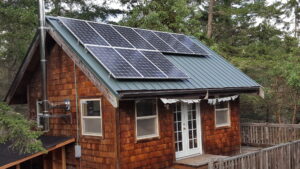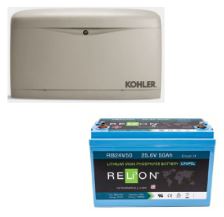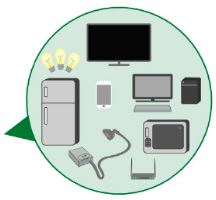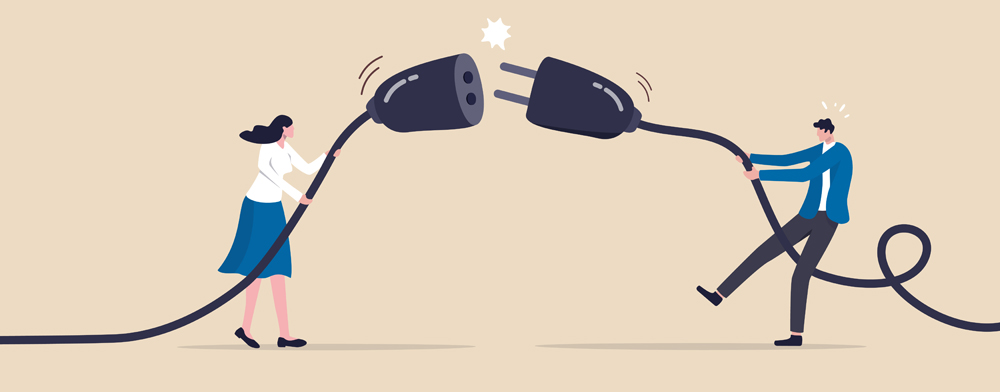Disconnecting from Your Utility: From on the Grid to Living Off Grid
Disconnecting from Your Utility: From on the Grid to Living Off Grid

Want to disconnect from your utility company and switch to living off grid? You are not alone!
The thought of permanently ditching a power bill and living a dreamy off-grid life with free power from the sun appeals to many, especially when your power choices on the grid feel limited. But as we like to say, “If it was that easy, everyone would be doing it.”
Off-grid power systems make sense for cabins or homes that are so far from the utility lines that power can’t be brought in, or where the cost to bring in power is prohibitive. For people already connected to the grid, it’s easy to have a rose-colored perception of what life would be like when you don’t have to deal with a utility. However, off-grid power is not recommended for those who are already connected to the grid because there are many more practical, convenient, and financially beneficial options that can fulfill your power system goals without cutting the lines.
Why not dump your utility?
First, disconnecting your home may be illegal and may invalidate the certificate of occupancy for your home. Even if you can legally disconnect, you’d miss out on the convenience that utility power offers. Being off grid essentially means that you are your own electricity provider for better and for worse. For example, if in the middle of the night you use more power than you have stored in your batteries, you will be without power until your batteries can be recharged – either with your solar panels or with your supplemental generator, because you can’t buy or “borrow” power from your utility.
 Next, off-grid electricity often comes with a higher cost than utility power. The initial costs of going off grid is often higher than you think, and it’s usually only worth it financially if the cost to bring in utility power costs more than $50,000. Yes it is true that once you go off-grid you have no more utility bill, but it is a misconception that when you go off-grid you purchase your equipment and never have to pay for electricity again. By choosing off-grid renewable power you don’t have a utility bill anymore, but you will have ongoing costs associated with powering a home off the grid – mainly fuel for your supplemental generator and battery replacement costs. These systems also may require planned equipment replacements that could outweigh any “savings” seen by removing a bill.
Next, off-grid electricity often comes with a higher cost than utility power. The initial costs of going off grid is often higher than you think, and it’s usually only worth it financially if the cost to bring in utility power costs more than $50,000. Yes it is true that once you go off-grid you have no more utility bill, but it is a misconception that when you go off-grid you purchase your equipment and never have to pay for electricity again. By choosing off-grid renewable power you don’t have a utility bill anymore, but you will have ongoing costs associated with powering a home off the grid – mainly fuel for your supplemental generator and battery replacement costs. These systems also may require planned equipment replacements that could outweigh any “savings” seen by removing a bill.
Most off-grid systems also require regular maintenance. Even if you invest in one of the ground-breaking lithium iron phosphate (LiFePO4) battery options to eliminate regular battery maintenance and ongoing replacement cost, you will still need to monitor your batteries and system, and do regular maintenance on your backup generator (a must for almost every off grid home). And remember, if your power system goes down for any reason, you are responsible for getting it back up and running again, not your utility. If you’ve ever been without power in the middle of a nasty storm and been glad you’re not the one out in the weather fixing the issue… well, you get the picture.
 And last but not least, being off grid means you will need to change your energy use habits – maybe a lot. When you’re off-grid, every appliance you use matters – every light bulb, every cell phone charger, every movie you watch on your TV. Off-grid living requires a significant shift in your power use mindset and habits, and the willingness to make choices about what you can and can’t operate, based on the status of your system and your ability to recharge your batteries. Oh, and don’t forget that when you go out of town, you won’t be able to just “set it and forget it”. Leaving an off grid home for any period of time takes planning so that you don’t come home and find all the food in your refrigerator and freezer spoiled because your home used too much power in your absence and didn’t recover without your assistance.
And last but not least, being off grid means you will need to change your energy use habits – maybe a lot. When you’re off-grid, every appliance you use matters – every light bulb, every cell phone charger, every movie you watch on your TV. Off-grid living requires a significant shift in your power use mindset and habits, and the willingness to make choices about what you can and can’t operate, based on the status of your system and your ability to recharge your batteries. Oh, and don’t forget that when you go out of town, you won’t be able to just “set it and forget it”. Leaving an off grid home for any period of time takes planning so that you don’t come home and find all the food in your refrigerator and freezer spoiled because your home used too much power in your absence and didn’t recover without your assistance.
Does that mean you’re stuck?
While off-grid may not be right for you, there are alternative power options that allow you to feel more in control of your power:
Want a reduced utility bill? Grid tie solar can help! By properly sizing a solar power system for your home, you can offset your power bill by however much you want, and use your utility provider as a “bank” for excess power you might produce at certain times of the year.
Want backup power when the power goes out? Consider adding batteries or a generator, with or without solar. This way you can power a few essential loads so that you have power even when the utility grid doesn’t.
Will it cost tens of thousands of dollars to bring power out to your cabin? Going off-grid may very well be right for you. Our team at Fire Mountain Solar has helped hundreds of people find the right solution to make off grid living convenient, comfortable, and cost effective.

